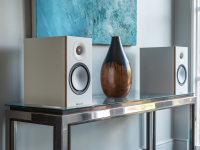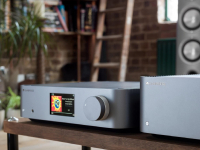
Cowon delivers a Hi-Res audio player that aims to get the most from your music.
It’s likely that more than a few of our readers won’t have heard of South Korean electronics manufacturer Cowon, but the company is huge back in its native territory, and has a big following all across the Far East. As well as making headphones and digital cameras, their real bread and butter is the dedicated audio player – although these are no outdated MP3 players left over from the mid-00’s ‘iPod’ boom. With a focus on the growing market for Hi-Resolution audio playback, Cowon’s portable players are aimed at the enthusiast who wants the best possible sound on-the-go.
Whilst some mobile phone manufacturers have improved audio playback over recent years, far too many models that hit the market each year still offer substandard audio, either due to poor quality inbuilt DAC (digital-to-analogue converter) implementation, or the use of basic (read: cheap) amplification on devices that still use 3.5mm outputs for connecting headphones. And whilst it’s true that the addition of a portable DAC to these devices can give a huge boost in performance, they can also often turn a sleek looking phone into a bulky and cumbersome mess that just isn’t practical for the daily commute. That’s where today’s review subject, the Cowon Plenue D, makes it’s entrance.
 A compact but solid feeling rectangle fashioned from aluminium, and measuring just 77mm in height, as well as a paltry 15mm in depth, the Plenue D gives off a premium vibe as soon as it’s removed from its packaging. Most of its small fascia is given over to a 2.8” touchscreen display, keeping the button count to a minimum and making navigation easy (but more on that later!). At the top of the unit is a 3.5mm jack output, and along the right hand edge are additional control and volume buttons that sit relatively flush to the Plenue D’s case. All told, if this unit had the name of one of the bigger brands known to us in the West (say, Sony, Panasonic or Samsung), nobody would bat an eyelid at how well made it is. Cowon have clearly spared no expense in making sure that the Plenue D is both built to last, and enjoyable to hold and use.
A compact but solid feeling rectangle fashioned from aluminium, and measuring just 77mm in height, as well as a paltry 15mm in depth, the Plenue D gives off a premium vibe as soon as it’s removed from its packaging. Most of its small fascia is given over to a 2.8” touchscreen display, keeping the button count to a minimum and making navigation easy (but more on that later!). At the top of the unit is a 3.5mm jack output, and along the right hand edge are additional control and volume buttons that sit relatively flush to the Plenue D’s case. All told, if this unit had the name of one of the bigger brands known to us in the West (say, Sony, Panasonic or Samsung), nobody would bat an eyelid at how well made it is. Cowon have clearly spared no expense in making sure that the Plenue D is both built to last, and enjoyable to hold and use.
Of course, that’s a big plus, but its audio capabilities are the real reason to own the Plenue D, so it’s nice to see that Cowon haven’t missed a trick here either. Based around a DAC chip that is capable of playing files in up 24-bit / 192kHz bitrates, the Plenue D also has an excellent inbuilt amplifier, with super-low Total Harmonic Distortion (THD) figures of just 0.0004%. What this delivers is clear and detailed sound, and compatibility with a huge range of headphones with little to no audible distortion or noise. A huge range of file types are compatible, with Hi-Res formats FLAC, WAV, AIFF and ALAC all supported, as well as the more traditional MP3 for lower bitrate files.
 An inbuilt memory of 32gb is fairly standard for this type of player, and the ability to extend up to an additional 128gb via MicroSD card is offered. With the cost of MicroSD cards lower than ever, this allows for large catalogues to be stored on multiple cards, and for those cards to be easily switched for playback. The Plenue D’s battery is good for playback of up to 100 hours if listening to MP3, with around half of that for Hi-Res formats, all from a single 3.5 hour charge.
An inbuilt memory of 32gb is fairly standard for this type of player, and the ability to extend up to an additional 128gb via MicroSD card is offered. With the cost of MicroSD cards lower than ever, this allows for large catalogues to be stored on multiple cards, and for those cards to be easily switched for playback. The Plenue D’s battery is good for playback of up to 100 hours if listening to MP3, with around half of that for Hi-Res formats, all from a single 3.5 hour charge.
With our FLAC files loaded and ready to go, it was time to take the Cowon for a spin…
Last year’s anniversary re-release of The Beatles Sgt. Pepper’s Lonely Hearts Club Band was a true revelation, with the audio cleaned up considerably, and the stereo imaging brought up to more modern standards. This perennial favourite now sounds better than ever, and the lossless FLAC release even better again. “A Day in the Life” sounded unbelievable through the Plenue D and into our Shure SR1540 headphones. John Lennon’s vocal had a solidity and clearness that belied the recording’s age, and McCartney’s bass had real weight to it in the right-hand channel. As the crescendo builds to lead us into the second verse, the orchestra’s increasingly frantic playing was easy to hear through, the Cowon defining each of the instruments clearly enough to pick out individual players.
 Music with a greater focus on rhythm was also a treat through the Plenue D, with the dub-techno of Porter Ricks Anguilla Electrica sounding full and rich. Heavy bass lines where no problem for the Plenue, and again separation and layering was fantastic, but musical cohesiveness was not lost either, with the tracks sounding more than just a number of individual parts. The Cowon was also quick and responsive when selecting the tracks for playback, and the menus and OS were intuitive and simple to pickup. Whether changing through albums or adjusting settings, the Plenue D was always snappy and really felt like a modern bit of kit.
Music with a greater focus on rhythm was also a treat through the Plenue D, with the dub-techno of Porter Ricks Anguilla Electrica sounding full and rich. Heavy bass lines where no problem for the Plenue, and again separation and layering was fantastic, but musical cohesiveness was not lost either, with the tracks sounding more than just a number of individual parts. The Cowon was also quick and responsive when selecting the tracks for playback, and the menus and OS were intuitive and simple to pickup. Whether changing through albums or adjusting settings, the Plenue D was always snappy and really felt like a modern bit of kit.
And that’s clearly what Cowon are aiming for: far from being an outdated concept, the dedicated music player definitely has a place in the life of the modern music listener, and is something that anyone who’s main listening is done on the move should seriously consider. Sound quality improvements alone are a huge plus point, with performance over both the Samsung S8 and iPhone 7 that we tried clear to hear from the off. Factoring in the saving to your mobile phone battery by not using it for audio playback, plus the relative lack of bulk compared to using a mobile plus portable DAC and it’s easy to see why the Plenue D is such a great buy!
Why not pop in to your local Richer Sounds to hear it for yourself?
Click here for to learn more about the Cowon Plenue D
Author: Chris, Liverpool store





